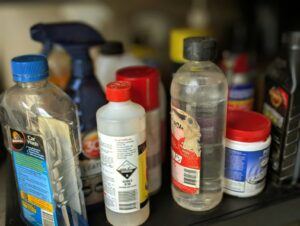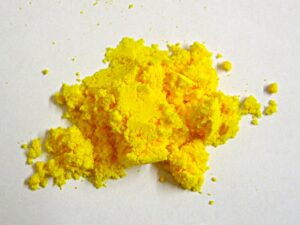10 Bad Ingredients to Avoid in Shampoo for Healthy Hair Care
In the quest for healthy hair, understanding the ingredients in your shampoo is crucial. Many hair care products contain harmful chemicals that can lead to irritation, dryness, and even hair loss. By identifying the bad ingredients to avoid in hair care products, you can make informed choices that promote the health of your hair and scalp. This article will outline ten bad ingredients commonly found in shampoos and explain why you should avoid them for optimal hair care.
Understanding Harmful Ingredients in Hair Care Products

Photo by Daniel Campbell on Unsplash
When it comes to hair care, it’s essential to scrutinize ingredient lists carefully. Many personal care products, including shampoos and conditioners, contain harmful ingredients that may not be immediately recognizable. These ingredients can range from sulfates and parabens to silicones and alcohols, all of which can negatively impact the health of your hair and scalp. By understanding what these ingredients are and the effects they have, you can take proactive measures to avoid these harmful chemicals in your hair products.
What Are Ingredients to Avoid in Hair?
Ingredients to avoid in hair encompass a variety of harmful substances. Sulfates, for example, are commonly used as cleansing agents but can strip your hair of its natural oils, leading to dry hair and scalp irritation. Parabens, often used as preservatives, have been linked to hormonal disruptions, while silicones can cause buildup, making hair look dull and lifeless. Additionally, alcohols can dry out your hair, exacerbating issues related to damaged hair. Familiarizing yourself with these shampoo ingredients to avoid is essential for maintaining healthy hair growth.
Impact of Bad Ingredients on Hair Health
The impact of bad ingredients on hair health can be significant and long-lasting. Harmful substances can lead to various issues, such as hair loss, increased dryness, and scalp irritation. For instance, shampoos containing sulfates can not only strip moisture from your hair but also irritate the skin and hair follicles, ultimately affecting hair growth. Using hair products with these damaging ingredients can create a cycle where you are constantly battling dry, damaged hair. To keep your hair in optimal condition, it’s vital to choose products free from these detrimental components.
Why Choose Natural Hair Care Products?
Choosing natural hair care products is an effective way to avoid harmful ingredients found in conventional shampoos. Natural ingredients often provide moisturizing properties that help maintain the integrity of your hair and scalp without the risk of irritation. By opting for shampoos that utilize plant-based extracts and essential oils, you can ensure that your hair receives the nourishment it needs without exposure to harmful chemicals. Moreover, natural hair care products tend to be gentler, making them suitable for all hair types, especially those with sensitive skin and hair.
Top 10 Bad Ingredients in Shampoo to Avoid

“Cer(IV)-sulfat” by BXXXD is licensed under CC BY-SA 3.0
1. Sulfates: The Cleansing Agents to Avoid
Sulfates are common shampoo ingredients that serve as cleansing agents, providing that lather many people associate with cleanliness. However, these harsh surfactants can strip your hair of its natural oils, leading to significant dryness and irritation. For individuals with sensitive skin and hair, using shampoos with sulfates can worsen scalp conditions and contribute to hair loss over time. Opting for sulfate-free alternatives can help maintain moisture levels in your hair and scalp.
2. Alcohol: The Drying Ingredient
Alcohol, often found in many hair care products, is notorious for its drying effects. While some alcohols can provide quick drying benefits, they can also lead to dry hair and exacerbate damage, especially in individuals with already fragile hair types. Using shampoos that contain drying alcohol can strip your scalp of essential moisture, resulting in irritation and flakiness. It’s crucial to check ingredient lists for types of alcohol that are known to be bad for hair and avoid these in your shampoo and conditioner.
3. Parabens: Preservatives that Can Harm
Parabens are synthetic preservatives commonly used in personal care products to extend shelf life. Unfortunately, studies have raised concerns regarding their potential link to hormonal disruptions and skin irritation. Regular exposure to parabens can lead to an accumulation in the body, which is particularly concerning for those looking to maintain healthy hair and scalp. Choosing paraben-free shampoos is an effective way to avoid these harmful ingredients and promote overall wellness.
4. Silicones: Temporary Solutions with Long-term Effects
Silicones are often added to shampoos and conditioners to provide temporary smoothness and shine. However, these substances can create buildup on the hair, leading to dullness and weighing hair down over time. Additionally, silicones can prevent moisture from penetrating the hair shaft, exacerbating dryness. To maintain healthy hair growth and avoid these detrimental effects, opting for silicone-free hair products is advisable, allowing your hair to breathe and thrive.
5. Synthetic Fragrances: Hidden Irritants
Synthetic fragrances are a common ingredient in many hair care products that can mask unpleasant odors. However, these fragrances often contain a cocktail of chemicals that can cause irritation and allergic reactions on the scalp and skin. Individuals with sensitive skin should be particularly cautious, as synthetic fragrances can exacerbate conditions like dermatitis. Opting for shampoos that use natural fragrances or are fragrance-free can help in avoiding these hidden irritants while promoting a healthier scalp environment.
6. Formaldehyde: A Toxic Ingredient in Hair Products
Formaldehyde is a known carcinogen commonly found in some hair products, particularly those marketed for straightening. Exposure to this toxic ingredient can lead to serious health concerns, including respiratory issues and skin irritation. Using shampoos and conditioners that contain formaldehyde can not only harm your scalp but also compromise overall hair health. It’s essential to read ingredient lists carefully and choose hair products that are free from this harmful compound to ensure the safety of your hair care routine.
7. Artificial Colors: Adding Harm to Beauty
Artificial colors in shampoos can make products visually appealing, but they often come with harmful side effects. These chemical dyes can cause allergic reactions and irritate the scalp, especially for those with sensitive skin. Furthermore, artificial colors do not provide any benefits to hair health; instead, they merely serve an aesthetic purpose. To maintain healthy hair and scalp, it’s wise to avoid shampoos that contain artificial colors and opt for naturally colored alternatives.
8. Propylene Glycol: A Skin Irritant
Propylene glycol is a common ingredient found in many hair products, used for its moisturizing properties. However, it can also act as a skin irritant, particularly for those with sensitive skin types. Prolonged exposure to products containing propylene glycol can lead to adverse reactions, including inflammation and discomfort. For individuals seeking to care for their hair and scalp health, avoiding shampoos that list propylene glycol among their ingredients is crucial for preventing irritation.
9. DEA and TEA: Potentially Harmful Compounds
Diethanolamine (DEA) and Triethanolamine (TEA) are compounds often used as thickening agents in shampoos. However, these ingredients can react with other chemicals and form potentially harmful nitrosamines, which are known carcinogens. Regular use of products containing DEA and TEA can pose significant health risks, particularly in long-term exposure scenarios. To protect your hair and overall health, it’s advisable to choose hair products that explicitly state they are free of DEA and TEA.
10. Petroleum Derivatives: Clogging Hair Pores
Petroleum derivatives, often used as emollients in hair care products, can lead to clogged pores on the scalp. This buildup can cause issues such as dandruff and hair loss, as it restricts the natural oil flow necessary for healthy hair growth. Additionally, these substances can weigh hair down, making it appear greasy and lifeless. To foster a healthy scalp environment, it’s essential to avoid shampoos that contain petroleum derivatives and instead opt for products with natural oils.
Choosing Safe Alternatives for Hair Care

Photo by Lisa Fotios on Pexels
Identifying Safe Shampoo Ingredients
Identifying safe shampoo ingredients is essential for anyone looking to maintain healthy hair and scalp. Natural ingredients, such as aloe vera, coconut oil, and shea butter, offer significant benefits without the harmful effects associated with synthetic compounds. When evaluating hair care products, it’s important to choose those free from sulfates, parabens, and silicones, which can cause irritation and dryness. By focusing on products that prioritize nourishing and moisturizing components, you can effectively support hair growth and keep your hair looking vibrant.
Benefits of Using Moisturizing Shampoo
Using a moisturizing shampoo can profoundly benefit the health of your hair and scalp. These shampoos typically contain ingredients designed to hydrate and nourish, preventing dryness and brittleness often caused by harsh chemical formulations. Regular use of a moisturizing shampoo can help restore the natural moisture balance, making your hair more resilient to damage and less prone to breakage. For those with curly or coarse hair types, incorporating a moisturizing shampoo into your hair care routine can lead to enhanced softness and manageability.
How to Read Labels on Hair Products
Knowing how to read labels on hair products is a crucial skill for making informed choices about your hair care. Ingredient lists are typically organized from the most to least abundant, so you can identify the primary components of the product. Look for terms like ‘sulfate-free,’ ‘paraben-free,’ and ‘silicone-free’ to ensure you are avoiding harmful ingredients. Additionally, understanding the effects of certain ingredients, such as alcohol and artificial colors, can help you steer clear of products that may lead to irritation, dryness, or even hair loss over time.
Conclusion: Achieve Great Hair by Avoiding Harmful Ingredients

Photo by Jovan Vasiljević on Unsplash
Summary of Ingredients to Avoid in Shampoo
In summary, achieving healthy hair begins with avoiding certain harmful ingredients found in shampoo and conditioner. Key ingredients to avoid include sulfates, which can strip your hair of its natural oils, and parabens, which act as preservatives but have been linked to hormonal disruptions. Alcohol is another detrimental agent that can dry out your hair, while silicones may lead to buildup, preventing moisture from penetrating. By familiarizing yourself with these ingredients to avoid in hair care products, you can make better choices for your hair health.
Tips for Healthy Hair Care Practices
Adopting healthy hair care practices is essential for maintaining vibrant hair and scalp. Start by selecting shampoos and conditioners that prioritize natural ingredients over synthetic chemicals. Develop a routine that includes regular washing with moisturizing shampoo to combat dryness and promote hair growth. Additionally, consider incorporating weekly treatments such as deep conditioning or oil masks, which can nourish your hair and prevent damage. Always ensure to read ingredient lists diligently to avoid harmful substances and support the overall health of your hair.
Encouragement to Opt for Natural Hair Care Products
Choosing natural hair care products is a proactive way to foster healthy hair and scalp. Natural ingredients, such as aloe vera and coconut oil, provide hydration without the risks associated with harmful chemicals. By opting for shampoos free from sulfates, parabens, and silicones, you can significantly improve your hair’s condition over time. Embrace the benefits of natural hair care, as these products not only promote healthier hair growth but also contribute to a more sustainable approach to personal care.
What are the most common ingredients to avoid in shampoo for healthy hair care?
When it comes to maintaining healthy hair, knowing the ingredients to avoid in hair products is essential. Some of the most common bad ingredients found in shampoo include sulfate, paraben, silicone, and various forms of alcohol. These substances can strip your hair of its natural oils, lead to irritation, and potentially even contribute to hair loss. Always check the ingredient lists of your hair care products to ensure they are free from these harmful substances.
How do sulfates affect my hair?
Sulfates are surfactants that create a lathering effect in many commercial shampoo brands. While they effectively remove dirt and oil, they can also strip your hair of its natural moisture, leading to dry hair and increased irritation for sensitive scalps. Opting for sulfate-free alternatives can help maintain your hair’s natural balance and promote healthy hair growth.
Why should I avoid parabens in my shampoo?
Parabens are widely used as a preservative in many personal care products, including shampoo and conditioner. However, they have been linked to hormone disruption and potential health risks. By avoiding parabens in your hair care products, you can minimize these risks and make a more conscious choice for your overall well-being and healthy hair.
What are the effects of silicone on my hair?
Silicone is commonly added to hair products for its smoothing properties, but it can create a barrier that prevents moisture from penetrating the hair shaft. Over time, this can lead to damaged hair and dry out your hair. If you’re looking for shine and smoothness, consider using natural ingredients like oils instead of relying on silicone.
How do alcohol and its variants affect my hair?
Alcohol and its variants can have several effects on hair, both positive and negative, depending on the type and amount used. Here are some ways alcohol can impact your hair:
- Dryness and Damage: Many hair care products contain alcohols, particularly those that are volatile (like ethanol and isopropyl alcohol). These types of alcohol can strip moisture from the hair, leading to dryness, brittleness, and potential damage. Over time, this can result in split ends and breakage.
- Scalp Health: Alcohol can also affect the scalp. It may lead to dryness and irritation, disrupting the natural balance of oils. A dry scalp can result in flakiness and may exacerbate conditions like dandruff.
3. Temporary Styling Benefits: On the flip side, some alcohols, particularly fatty alcohols (such as cetyl alcohol or stearyl alcohol), can be beneficial. These types of alcohols are often used in conditioners and can help to moisturize and soften hair, enhancing manageability and shine.
4. Product Build-Up: Frequent use of alcohol-laden products can lead to build-up on the hair and scalp, which may require clarifying shampoos to remove. This build-up can weigh hair down and make it appear dull.
5. Color-Treated Hair: If you have color-treated hair, using products with high alcohol content can be particularly damaging. Alcohol can strip color and lead to faster fading, impacting the vibrancy and longevity of your hair color.
6. Hydration and Repair: To counteract the drying effects of alcohol, it’s important to incorporate moisturizing treatments and deep conditioning products into your hair care routine. Look for products that contain hydrating ingredients like oils, butters, and humectants.
7. Moderation is Key: It’s not necessary to completely avoid alcohol in hair products, but moderation is important. Checking ingredient labels and opting for products with lower alcohol content can help maintain hair health.
In conclusion, while alcohol can have certain benefits in hair care formulations, its drying effects can outweigh those benefits if used excessively. It’s crucial to choose the right products for your hair type and consider incorporating hydrating treatments to keep your hair healthy and vibrant.

